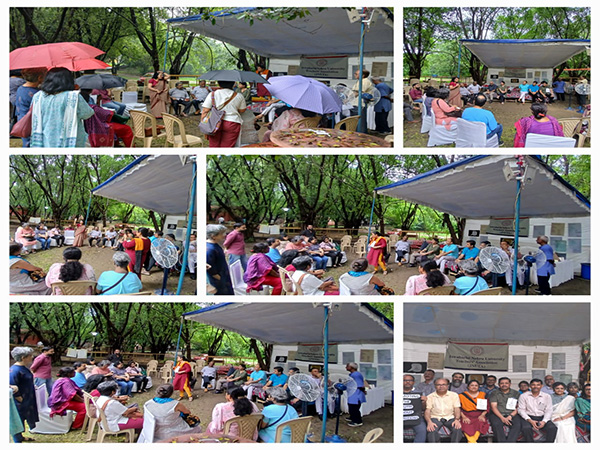JNU teachers' association begins 24-hour hunger strike in protest against 'delayed promotions'
The University of Delhi (DU) has climbed five spots to secure the sixth position in the National Institutional Ranking Framework (NIRF) 2024.

- Country:
- India
The JNU teachers' association today began its 24-hour hunger strike and dharna in protest against, among other issues, the increasingly high handed, arbitrary, and discriminatory approach of the university administration towards appointments and promotions of JNU faculty under the Career Advancement Scheme (CAS). Braving the inclement weather and heavy rain, a large number of faculty members joined the dharna and also extended solidarity to the colleagues (including the JNUTA President) who are observing a 24-hour hunger strike as part of the protest.
Former DUTA and FEDCUTA President Nandita Narayan, and Elected teacher member of the Delhi University Academic Council, Maya John, also joined the protest and expressed their solidarity by addressing the faculty - and drew attention to the common essence of the struggles taking place in different universities. The AUDFA (Ambedkar University) also conveyed its solidarity and the JNUTA President in turn conveyed the wholehearted support of the JNUTA for the struggle being waged by the AUDFA.
This protest to demand justice for teachers comes in the background of "a stalled and deformed promotion process of which almost every teacher of the University is a victim in one form or the other". The promotion process was already characterized by several problems - selectivity, inordinate delays, and illegally forcing teachers to give up some of their due as the 'price' for promotion, stated an official release by the University. Now the process is at a complete standstill even though the number of promotions that have become due are mounting by the day - and this is a deliberate act and a breach of promise, to stop teachers' representatives from raising concerns about the harassment and victimization of teachers through the process and the denial of legitimate rights to most of them.
In other words, promotions are being instrumentalized in an attempt to beat faculty into submission and systematically discriminate against faculty based on the social or religious background, on the basis of their academic or ideological/political positions, and on account of their criticisms of the acts of commission and omission of the JNU administration, the release said. The JNUTA is protesting against the anomalies not only in promotions but also in appointments. The same systematic practice of discrimination against, and victimisation of JNU faculty and those seeking to become part of the faculty is taking place in appointments.
There has been a serious erosion of the academic element and checks and balances in the appointments process - with the sidetracking of the role of Centres in preparation of expert panels, short-listing and even their statutory representation through Chairperson in the selection committee. The integrity of the faculty appointment process that was compromised so severely under the 'leadership' of the previous Vice Chancellor continues to be under a serious cloud. One consequence of this is that a large number of vacancies have remained unfilled because apparently Selection Committees found no candidate suitable - it is not surprising that most of such vacancies are in reserved posts.
The JNUTA sees the issues in promotions and appointments as symptoms of a larger erosion of norm-based system of democratic governance that JNU has suffered under its previous and current Vice-Chancellor. The centralization of powers in the Administration and its complete lack of transparency and accountability also set the context for an increasingly politically-idelogically oriented government intervention in the University and erosion of its statutorily granted autonomy. JNU's admission process and the chaos surrounding it is a prime example of this process as well as its consequences. (ANI)
(This story has not been edited by Devdiscourse staff and is auto-generated from a syndicated feed.)










